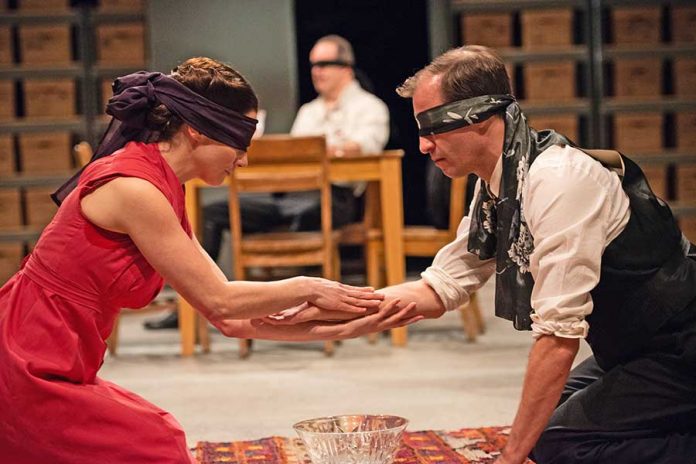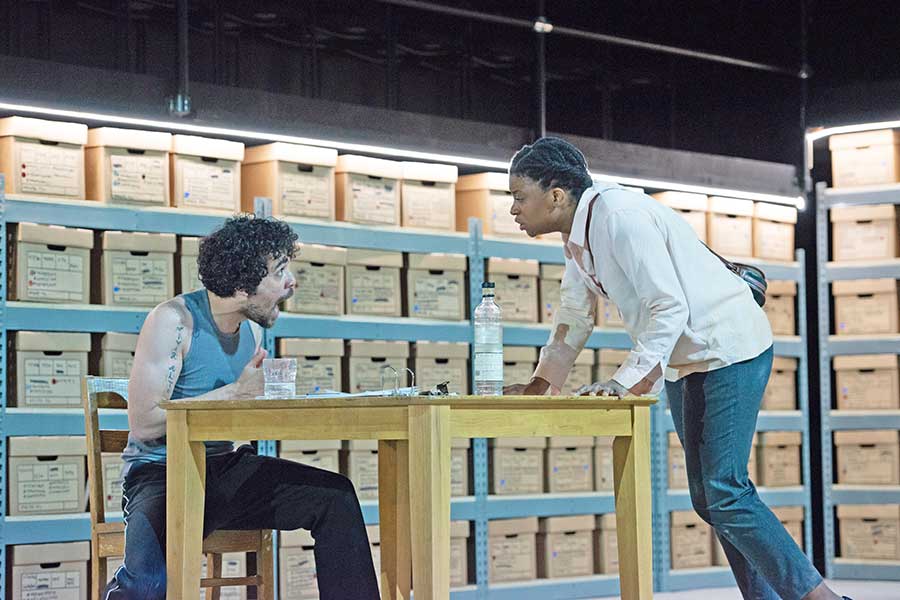
Have you heard of qureshi? Probably not. In the first scene of Rajiv Joseph’s “Describe the Night” — a fascinating and occasionally frustrating play now on stage at the Wilma Theater — writer Isaac Babel (Ross Beschler) explains the recipe to Nikolai Yezhov (Steven Rishard).
It’s a beef broth studded with live leeches, and the diner must prick his fingers and stick them in the bowl before chowing down. The leeches feed on blood, then you feed on the leeches.
Babel made the dish up to amuse Yezhov, then a soldier in the Red Army, as they passed time in a chilly Polish forest in 1920. But in the penultimate scene of the first act, set in 1989 Dresden, a KGB officer named Vova played by out actor Keith J. Conallen sets down to a bowl of qureshi in an old woman’s modest apartment. The lie of the past becomes the truth of the present.
Joseph’s play, which debuted in New York in 2017, considers the construction of history as a narrative where fake news can obfuscate real events. Although the setting is Eastern Europe from the dawn of the Soviet Union through the suspicious plane crash that killed Polish president Lech Kaczyński in 2010, the resonance with modern-day American misinformation is undeniable.
Similarly, Joseph plays with historicity, resurrecting actual figures and juxtaposing them with his own fictional creations. Yezhov, who rose to the chief position in Stalin’s bureau of internal affairs, was killed in 1940 for anti-Soviet activity. His wife Yevgenia committed suicide two years earlier.
“Describe the Night” finds both Yezhovs alive — if not exactly well — in 1989. Nikolai, now a factotum in an obscure government office, insists that his “death” was a sham, just another fiction accepted as fact. Yevgenia (Sarah Gliko) has become an oracle of sorts — predicting war, the fall of the Berlin Wall and the upward trajectory of Vova, whom she claims will one day be president.
I should mention that “Vova” is a diminutive of Vladimir. Fill in the blanks.
The drama weaves together various strands of plot in an intriguing and unsetting way. This includes a final coda involving Mariya (Brett Ashley Robinson), a Moscovite journalist who happens to be in the wrong place at the wrong time. Journalists, in Russia and the U.S., always seem to get the short shrift.
Yet the proceedings are sometimes too obvious for their own good, as the supposedly hidden meaning of a scene becomes apparent long before it reaches its conclusion. Joseph rarely makes a point once if he can restate it a half-dozen times. The repetitious nature of the script makes it hard to justify a nearly three-hour running time — a ruthless editor would be welcome to get the work in fighting trim.

Under Blanka Zizka’s direction, the Wilma production similarly lacks much forward momentum. A sense of tension is missing from the charged encounters at the heart of the play, as when Yezhov confronts Babel, his unlikely friend, over the writer’s affair with Yevgenia. When a play stretches on for as long as this one does, it needs a sense of snap; here, it too often drags.
Similarly, Matt Saunders’ grey, industrial set design — a boxed-in playing space dotted with walls of rotting file boxes — too literally conveys the rigid, Kafkaesque subtext of life under a repressive regime. Thom Weaver’s lighting has the opposite effect: it’s fantastical in a play that needs stark realism.
Rishard and Gliko strike the right balance of mystery and malevolence as the young Nikolai and Yevgenia, but their performances grow cartoonish when they return to these characters in old age. Conallen, by contrast, presents Vova as an embodiment of the banality of evil, all cool bureaucratic posturing that masks a malicious streak. In small roles, Campbell O’Hare and Anthony Martinez-Briggs do well as a pair of young people crushed under the boot of their restrictive societies.
Joseph smartly asks us to consider what happens when we, as a people, begin to blindly accept as truth anything that comes from the mouth of authority. But “Describe the Night” often feels too engorged for its own good.
“Describe the Night” continues through Feb. 16. For tickets and information, visit wilmatheater.org.